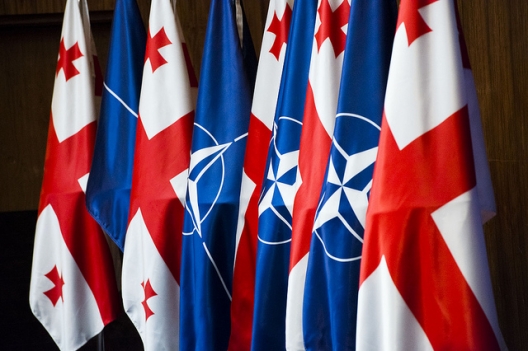 NATO countries, wary of antagonising Russia, are unlikely to grant former Soviet republic Georgia a formal step towards membership of the alliance at a summit in September, NATO diplomats say.
NATO countries, wary of antagonising Russia, are unlikely to grant former Soviet republic Georgia a formal step towards membership of the alliance at a summit in September, NATO diplomats say.
With NATO-Russia tensions running high after Moscow’s annexation of Ukraine’s Crimea region, the question of whether to invite Georgia to join the Membership Action Plan (MAP), putting the country closer to its goal of NATO membership, has spawned conflicting views in the alliance.
Some allies oppose granting Georgia MAP membership, fearing it could provoke Russian retaliation, whereas others say it would look as if NATO was bowing to Russian pressure if it did not. One NATO diplomat said the alliance was split 50:50 – and therefore far from requuired consensus. . . .
[S]ome allies feel it would be needlessly provocative to Russia – which still has several thousand troops near Ukraine’s border – to invite Georgia to join MAP now.
“It’s not very likely they will get MAP,” one NATO diplomat, speaking on condition of anonymity, said.
NATO should not show weakness, but it should also not take steps “that would irritate Russia without bringing anything to the alliance,” he said.
But a diplomat from another country commented: “Not giving MAP to Georgia because of Russia is the wrong thing to do.”
MAP is a programme of advice, assistance and practical support tailored to countries wishing to join the alliance.
One diplomat said around a dozen of NATO’s 28 members were reluctant to invite Georgia into MAP and predicted that the alliance would be unable to reach the required consensus.
NATO appears likely to settle on a compromise by giving Georgia a package of “reinforced cooperation” with NATO that would fall short of MAP. This package could include measures such as closer political cooperation, training the Georgian armed forces and strengthening NATO’s liaison office in Georgia.
France thinks the timing is not right to invite Georgia to join MAP and Germany is also opposed, the diplomats said.
Some allies question whether NATO – whose limited military presence in eastern Europe has been exposed by the Ukraine crisis – could credibly extend its security guarantee to Georgia, with its two Russian-backed breakaway regions.
Image: About a dozen of NATO's 28 members reluctant to see Georgia join alliance (photo: NATO)
